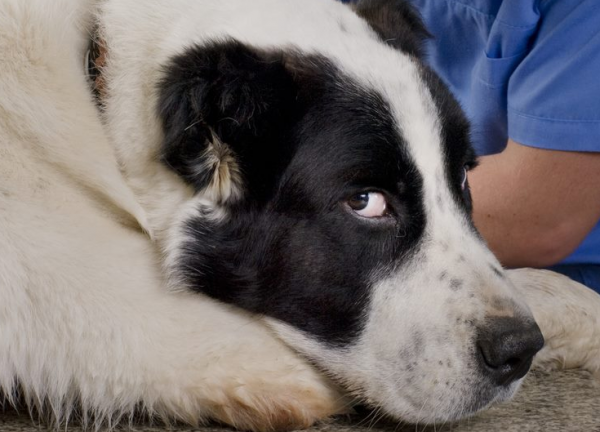Do you need help?

Why is my dog being sick?
Dogs throw up for lots of different reasons. Vomiting is often brought on by a sudden change in diet, through scavenging, such as eating human foods, from motion sickness or even eating too much or too quickly.
Other more serious reasons for a dog being sick include infection, worms, eating foreign bodies such as socks or toys, or swallowing or licking certain flowers, plants or toxins that are poisonous to dogs. More critical medical issues such as cancer or kidney, liver, or pancreatic disease could also be to blame.
When should you be concerned about a dog throwing up?
If your dog is projectile vomiting or frequently or constantly being sick you should contact your vet right away. It’s also a cause for concern if your dog can’t keep water down, if they’re vomiting bile, if they have blood or unusual material in the vomit, or are showing also signs such as lethargy, depression, discomfort or bloating, so get in touch with your vet right away in these cases too. Other reasons to call a vet include decreased urination, a combination of severe vomiting and diarrhoea, and abdominal pain.
You should also seek urgent advice if you are aware your dog has eaten something they shouldn’t have such as chocolate, macadamia nuts, onions or raisins or is making repeated attempts to throw up but bringing nothing up. This is a symptom of gastric dilatation and volvulus (GDV or bloat), which can be life-threatening.
What to do when your dog is being sick?
If your dog has been sick a few times but otherwise appears well:
- Remove all food and water for two hours
- After this time, allow your dog to have small amounts of water – offer this half-hourly a few tablespoons at a time – but withhold food for a further 6-8 hours
- If your dog’s vomiting has stopped, reintroduce small meals (1-3 tablespoons) of a bland low-fat cooked food such as chicken or white fish and rice and or pasta every hour or two. Plain cooked egg is also suitable. Fats, dairy and raw meat should be avoided.
- If no further signs are seen, your pet can gradually return to a normal diet the following day. Give the food in 4-6 small meals and introduce gradually by mixing with the bland diet, increasing the proportion of normal diet with each subsequent meal.
If this does not solve the sickness problem you should call your vet or, out of hours, your nearest Vets Now pet emergency clinic or Vets Now 24/7 hospital.
How can I tell if my dog is going to be sick?
Dogs tend to drool, lick their lips, and swallow excessively when they feel nauseous. Some may eat grass, possibly to relieve gastric irritation, or to make themselves sick. When your dog is sick you’ll typically see strong abdominal contractions.
What to feed a sick dog?
You should hold back giving water to a sick dog for two hours and food until 6-8 hours after their last episode of vomiting. Once this period is over reintroduce small, bland meals such as white chicken or rice gradually. If everything is ok the next day your dog can gradually return to their normal diet.
Why does my dog keep being sick after eating?
There are lots of reasons why dogs might vomit after eating including eating too much or too quickly or a sudden change in their diet. More serious causes can include eating something toxic (like these human foods that are bad for dogs) or swallowing something they shouldn’t (like a toy or a ball) and if you suspect this might be the case, always contact a vet right away. It’s also possible that dogs vomiting after eating could be a sign of another illness that might need veterinary attention so get in touch with your vet if you’re concerned at all. Whatever the cause, frequent vomiting is something that you should not ignore.

Why is my puppy being sick?
It’s common for puppies to suffer from vomiting and diarrhoea. Puppies throw up for a variety of reasons, including the stress of rehoming, parasites such as worms and amoebae, bacterial infections, viral infections, and, of course, dietary indiscretion (eating something they shouldn’t).
Similar rules apply to puppies suffering sickness as adult dogs, but be aware that puppies are a lot quicker to become dehydrated. If you have any concerns it’s better to be safe than sorry and get them checked by a veterinary surgeon.
How will my vet treat my vomiting dog?
Your vet will check your dog over by performing a clinical examination and also ask you questions to see what you have observed at home. They may also need to perform blood tests, urine tests, x-rays or an ultrasound to work out what is going on.
Treatment will depend on the diagnosis but may include intravenous fluids – a drip – to correct dehydration, antibiotics if an infection is suspected, anti-vomiting medication and stomach protectants. If your vet believes the sickness is being caused by a foreign body, it’s likely surgery will be required.
How can I prevent my dog being sick?
Lots of causes of dog vomiting can’t be prevented. But by removing potentially harmful foods, bones or objects from your dog’s environment you can help minimise the risk of them swallowing a foreign body or eating something poisonous. Try not to change your dog’s diet suddenly and try to prevent them from scavenging and eating rubbish or leftovers.
Does grass make dogs vomit?
Lots of dogs and puppies eat grass and, in most cases, this isn’t a problem. The main reason puppies and younger dogs do it is boredom, rather than because they’re unwell or have a nutritional deficiency. In adult dogs, it could be any of these things or simply because they like the taste or feel of grass. Studies have shown that fewer than one in 10 dogs are ill before eating grass while less than one in four vomit afterwards.
Do you still need help?
If your dog is unwell at night, at the weekend, or during a bank holiday, when your daytime vet is closed, our teams are here for you at more than 60 clinics across the UK. Click here to find the phone number and address of your nearest Vets Now emergency clinic.
If it’s not an emergency but you would like some advice, you can video chat with PawSquad vets from the comfort of your home. Find out more about PawSquad here.

